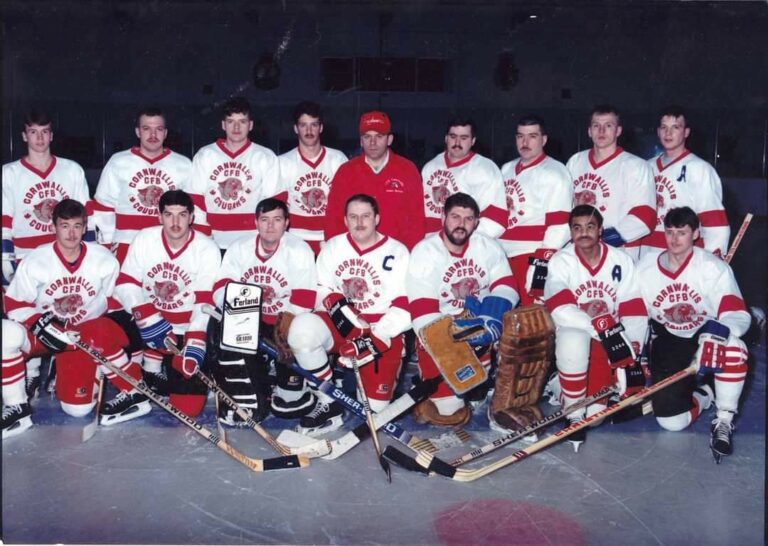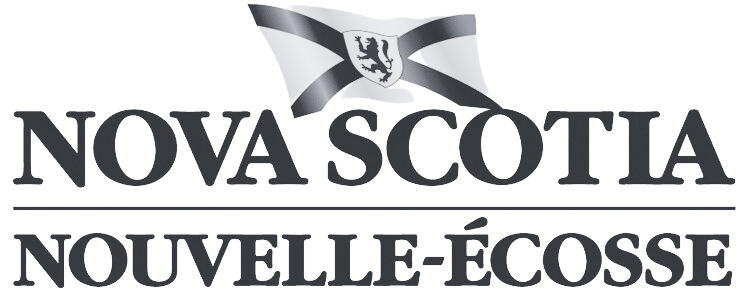Written by Denise Withers
After playing rep hockey for years in Ontario, Kerry Johnson suddenly found himself benched when trying out for the high school hockey team in Digby Nova Scotia in the 1970s.
At first, he couldn't figure it out, because racism hadn't been a big issue in his life until then. But after watching the white kids at practice and seeing how much better he was, the truth hit him hard.
"I was sitting on the bench. And I was not happy, looking on the ice and seeing that there were guys there playing, and I know – not to brag – but I know I was better than them. I had some skills by then playing competitive hockey. And when we practiced, they could see that I was quite capable of playing on that team. And I never got a chance to play."
After getting just one shift in his first three games, he quit and joined the Sea Cadets. Three years later, he left school too and joined the military, tired of the struggle to feel like he belonged there.

Home is wherever the game takes us
Kerry found his home in the military, the same as his Dad. And the first thing he did when he joined up was to get on a hockey team. That was where he discovered what he calls his "sweet spot". The others he played with didn't care about his skin colour – they just wanted to play great hockey. The game was open to everyone who wanted to play - even women.
Kerry spent the next two decades posted to bases across the country, eventually settling in Calgary, playing high-level hockey that was even better or as good as Junior B.
When he retired, he found himself back in Digby to be close to his family. And was disappointed to discover that racism there was just as bad as ever.
"When I came back, I said, 'Well, if I gotta live here, things are gonna change. And I've been doing that ever since."
He decided to become a hockey referee, hoping to have some influence on the culture of the game. Over the 8 years, he reffed hundreds of games, quickly earning the nickname "No Nonsense Johnson".
Hockey has become a rich kid's sport
But he still saw many groups in society being excluded from the sport he loved so much, including Blacks and girls. Like many rural areas, Digby County was quite segregated, with four distinct communities – French, "rich" white fishermen, poor fisheries workers and minorities. And the only thing that had ever brought them together was hockey. Except that now, only kids from the promenade families were playing – many others couldn’t afford it.
"It's a one-industry town - fishing. So there are not a lot of high-paying jobs here. Unemployment is high because fishing is a seasonal thing. And hockey comes up during that time, as does Christmas. Plus the ones who do work are in the minimum wage bracket; service jobs in shopping centres and restaurants. So hockey within the Black community has just died because it's too expensive to play. So my goal was, 'How can we bring hockey back in this area – where 33% of the kids in Digby County are living in poverty?'"
When Kerry heard that the Future of Hockey Lab was looking for people to help make the game more accessible and welcoming, he jumped at the chance to help.
Finding community in the FHL
At first, he didn't know what to expect – and was surprised to discover at the initial workshop that he'd found his people.
“I went in there with a chip on my shoulder at the beginning and didn’t say a word. But then I realized that what they were talking about was just what I was thinking. Just like they read my mind and they were reading it back to me. Everything. And I thought, 'Wow. You guys are right on. I'm in a great place.' They're trying to incorporate hockey so that it includes women and anybody else that wants to play, to give them the opportunity to be able to do that."
That's when he realized that maybe, just maybe, this time, he could make a difference.
Unfortunately, the timing of the FHL's first cohort was a problem for Kerry. He had his hands full trying to get a new Centre of Excellence community centre being built in Acaciaville and was dealing with health challenges that affected his memory. Still, he did what he could, working with the innovation coaching team to try to find clarity about the best place to get started.
Let them play
Then one day, it hit him. He could use his experience playing in the military as a model to create a new kind of hockey community in Digby – one where everyone who wanted to play could.
"It seems like the military is so far advanced when it comes to sports. You work together because you’re there to do a job and the feelings don’t matter. That's what you learn in the military. If you wanna play – play. Let's get a team. So it's always encouraged."
But to create a new model for inclusive hockey, Kerry would have to figure out how to overcome a few barriers. First, registration. Instead of following some complex online system, he decided he'd do what they'd done when he was a kid – get the schools to send a signup form home with kids. Every child is in school. So they'd all get to know about it and it would make it easy for the parents. Then, once they were signed up, they'd get to play for free - meaning no fees for equipment or ice time until they were 9 years old.
Kerry's theory of change is that, if he can make hockey free for a few years and re-build interest among the excluded communities, he'll be able to figure out how to find the money to pay for it on an ongoing basis.
Working with the FHL, Kerry sketched out a plan to test his idea. Then he took it to the recreation coordinator in town. Though she loved it, she couldn't see how he could make it happen. "We're going to need money for this, Kerry. A lot of it!"
Change starts with a powerful vision
But he's not letting that stop him. Kerry knows the benefits of hockey. That it teaches leadership and team skills, builds resilience and respect, and creates lifelong hockey habits. That it has the potential to bring the segregated people of Digby together, to create a stronger, more inclusive community.
He also knows that there are big corporate sponsors who recognize that enrolment in hockey is dropping – fast – and will be keen to support new kids coming into the game.
With his hands still full building the new community centre, Kerry doesn't have the time yet to put his plan into action. But he is going to start planting the seeds this fall, reaching out to allies and sponsors, and creating buzz among parents and kids through the schools.
Working with FHL has been key to helping him get this far.
"The FHL gave me my outlook. They made me see that it is possible for me to do what it is that I say I'm going to do."
Kerry knows that changing the culture of the game won't be easy. But he loves hockey too much to let others go through life never knowing the joy of streaking down the ice, ripping a shot top shelf and collapsing in a joyous heap with teammates when you finally win a game.
That's why he's putting all his social capital to work – not just to make it easier for kids to play hockey – but also to create a stronger community that can help lift the whole region up.
"There are folks within our community who think like I do. Not many, but there are two or three of us who are trying to create inclusion. What we're doing here is trying to get a community back together where they're segregated. We have an avenue to do that with hockey. But it's very expensive. The kids here live in an impoverished area. So let them play hockey. And we’ll see where that takes us."



